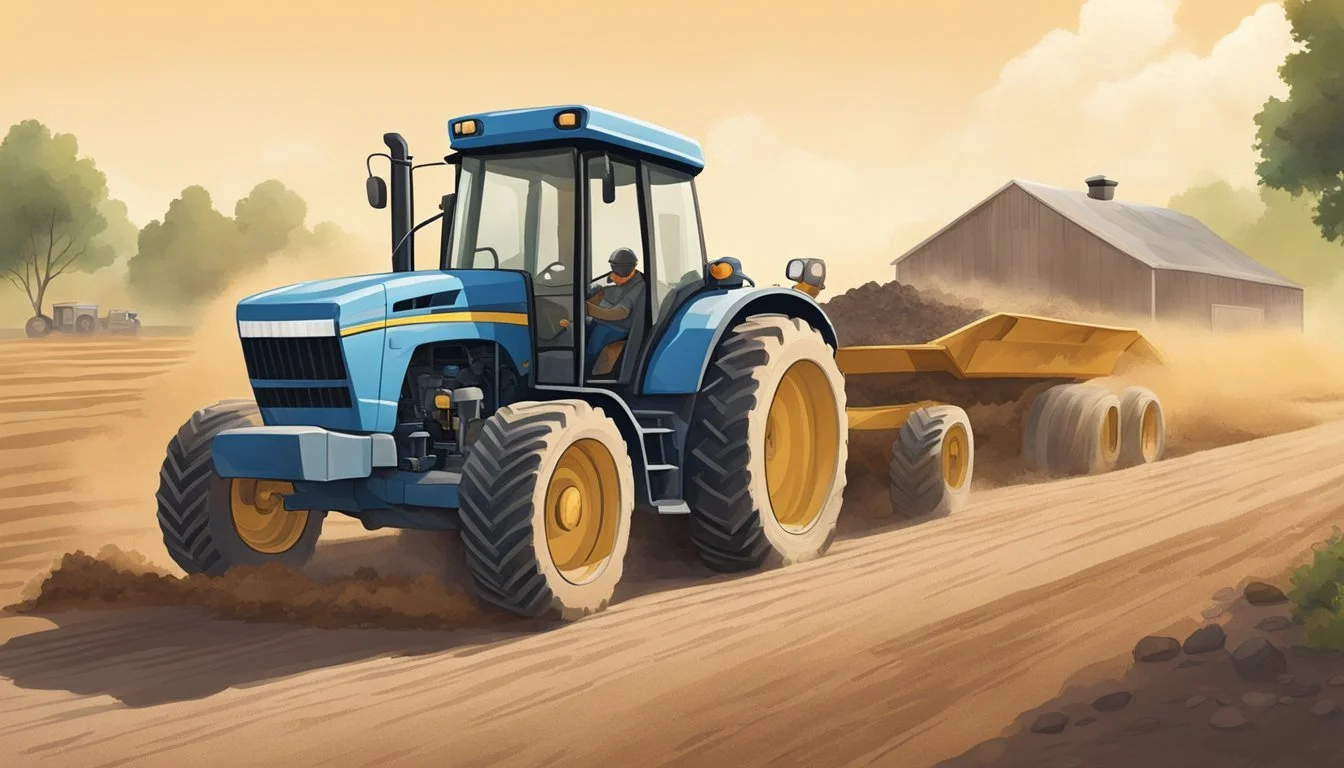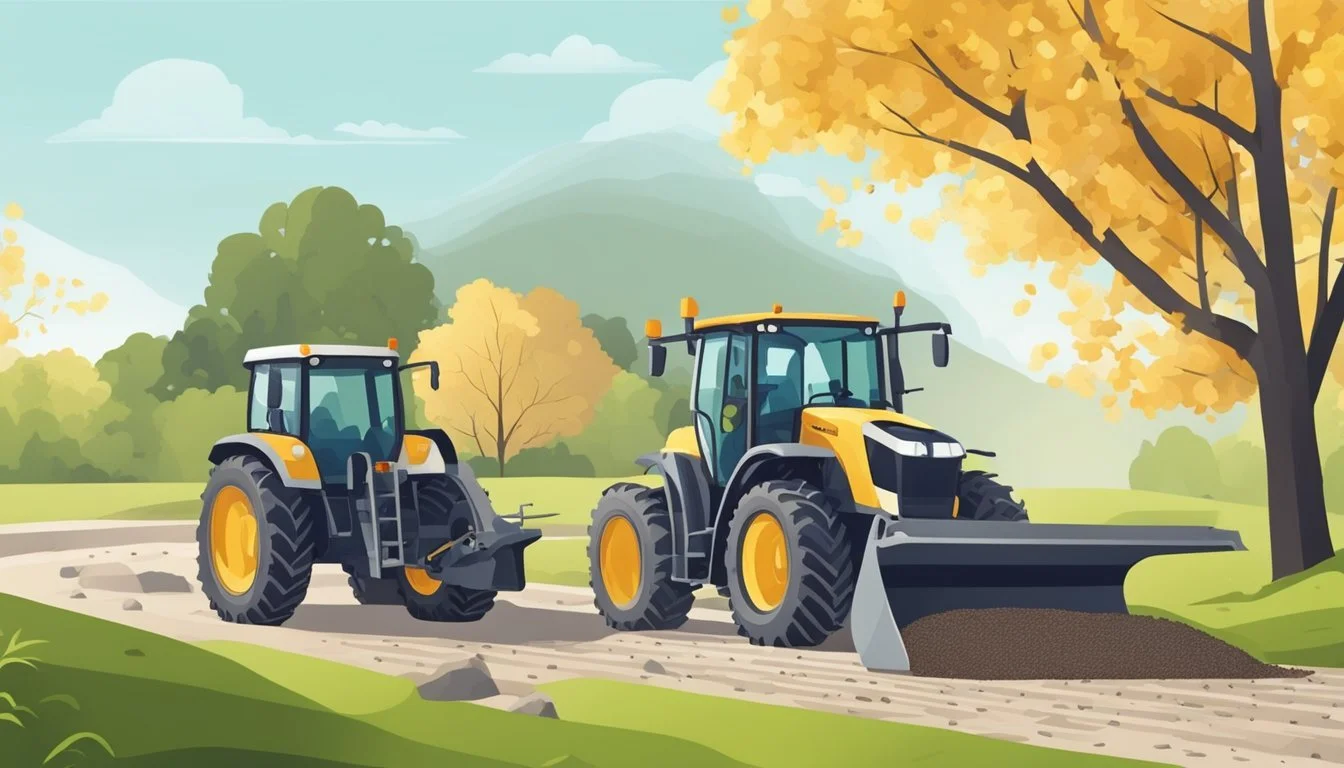Farm Driveway Maintenance
Essential Tips for Durability and Appeal
Maintaining a farm driveway is essential for ensuring reliable access to farmland throughout the year. Farm driveways often bear the weight of heavy machinery and endure constant exposure to the elements, which can lead to surface wear and degradation over time. To sustain their integrity and functionality, these driveways require a thoughtful approach to construction, coupled with regular maintenance like consistent gravel driveway repair.
The foundation of a durable farm driveway lies in its construction, where proper layering techniques and materials are key. A typical driveway on a farm might start with a base layer of large crushed rock to facilitate moisture drainage, followed by a finer grade of stone for the driving surface. This structure helps to prevent water accumulation and the formation of potholes or washboarding.
Regular upkeep, particularly after seasonal challenges like snow removal during harsh winters, is crucial for extending the life of a gravel driveway. Monitoring and managing the condition of the drive, reinforcing the surface with periodic additions of fresh gravel and other material, and ensuring proper drainage are all ongoing tasks that contribute to long-lasting driveways for your farm..
Essentials of Farm Driveway Maintenance
Maintaining a farm driveway involves understanding its structure and selecting the right materials for durability and longevity.
Understanding Driveway Structure
A driveway on a farm must support heavy loads and frequent traffic. It typically consists of multiple layers: a foundation, a road base, and a surface material. The foundation should be stable and well-compacted to ensure proper drainage and to prevent shifting. The road base, often made from crushed stone or coarse gravel, provides a supportive layer that distributes weight evenly.
Selecting the Right Materials
Choosing appropriate materials for a farm driveway is crucial for minimal maintenance and maximum efficiency. The top layer of the driveway, the material that is visible and driven on, is selected based on factors such as climate, usage, and local availability. It's important to consider which common driveway materials is best fit for your area.
Gravel driveways are quite popular, largely because they are permeable, allowing water to pass through easily, which can be particularly beneficial in preventing runoff issues. They're also an affordable option for many homeowners. When choosing gravel, it's best to opt for angular pieces as opposed to smooth ones; the angular shape helps the gravel lock together, creating a more stable surface.
Crushed stone is another budget-friendly, popular driveway material choice that's similar to gravel in its use. It can also enhance the driveway's appearance, offering a more polished look with a variety of color options available. This affordable driveway option both offers affordability and good looks.
If you're considering something more durable, a concrete paved driveway might be the way to go. It's known for its longevity and requires very little maintenance. However, it is generally more costly upfront, and if it's not properly installed, concrete can be susceptible to cracking in freezing temperatures.
Asphalt is a fantastic choice if you're looking for a smooth driveway that's quieter than gravel when driven on. Do keep in mind though, asphalt driveways need periodic sealing to maintain their condition and appearance over time.
For aggregate choices, materials like limestone may be used if available locally, as they can be compacted firmly and provide a sturdy driveway surface.
Practical Maintenance Techniques
Maintaining a smooth, healthy, long-lasting driveway for your farm involves regular attention to ensure it remains safe, functional, and accessible. Adhering to a set of practical maintenance techniques helps to prevent common issues such as potholes, erosion, and improper drainage that can be exacerbated by heavy traffic loads and severe weather. Also, knowing how to maintain your driveway is going to save you plenty of time and money in the long run.
Regular Inspection and Repair
It's always a good idea to keep a watchful eye on your driveway for any signs of wear, such as the dreaded potholes, unsightly ditches, or the effects of erosion. Regular inspections can go a long way in nipping potential problems in the bud. When you catch these issues early, immediate repair can help you avoid more extensive—and expensive—damage down the line.
When it comes to minor wear and tear, compaction is your friend. Using a roller or similar equipment can help ensure that your driving surface remains solid and reliable. And if you do encounter potholes, don't worry! They can be filled with the right materials and then compacted properly to restore the integrity of your driveway and prevent any further deterioration. Remember, a little bit of maintenance can make a big difference in extending the life of your driveway.
Weather-Related Maintenance
Having a proper surface drainage system in place is key to mitigating any water flow issues you might face with your driveway. It's important to make sure that features like ditches and culverts are well-maintained, and that the crown of your driveway is shaped to allow for efficient water runoff. This way, you're actively preventing water from pooling and causing potential damage.
Once winter rolls around and brings with it an ice storm or two, maintenance becomes even more crucial. Snow removal and treating icy conditions are essential to keep your driveway safe and navigable. After you've plowed the snow, it's a good idea to do some grading. This helps to return any displaced gravel back to the driveway, which not only keeps it looking neat but also maintains the proper shape and surface of your driveway. With these simple steps, you can help ensure your driveway stands up to the challenges of winter weather.
Equipment for Upkeep
To keep your driveway in tip-top shape, regular grading is essential. By using a tractor-mounted box blade or even a bulldozer, you can make sure that the surface of your driveway stays level, which is crucial for a smooth ride. Plus, proper grading isn't just about a flat surface; it also helps maintain the correct slope and crown, ensuring that drainage is up to par and water flows off efficiently, preventing any potential issues.
When it comes to tackling the bigger maintenance jobs, don't shy away from bringing out the heavy equipment. Tools like a three-point hitch box blade come in really handy for significant tasks, whether you're backfilling ditches or fixing areas of erosion. With the right equipment, you can keep your driveway well-maintained, no matter what Mother Nature throws your way.
By integrating these techniques into regular maintenance schedules, farm driveways can remain in good condition, sustaining the rigors of daily farm activities and traffic loads.




